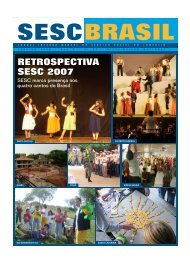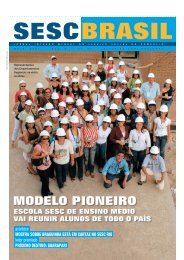BIBLIOTECA E CIDADANIA ESCOLA E SAMBA: SILÊNCIO ... - Sesc
BIBLIOTECA E CIDADANIA ESCOLA E SAMBA: SILÊNCIO ... - Sesc
BIBLIOTECA E CIDADANIA ESCOLA E SAMBA: SILÊNCIO ... - Sesc
You also want an ePaper? Increase the reach of your titles
YUMPU automatically turns print PDFs into web optimized ePapers that Google loves.
O acesso ao conhecimento é ponto crucial na formação do cidadão, e uma<br />
das instituições responsáveis por esse processo, que deve ser democrático<br />
e irrestrito, é a biblioteca pública. Tal função, definida pela Unesco, é hoje<br />
aceita internacionalmente. A visão tradicional de biblioteca pública mudou e<br />
ampliou-se sobremaneira. Não é mais um mero “depósito de livros”, como<br />
pode ter sido vista no passado, mas um centro de informação, cultura e lazer,<br />
destinado a uma posição ativa na sociedade. Exemplos de bibliotecas-cidadãs<br />
encontram-se em diversos pontos do planeta. No Brasil, constituem o equipamento<br />
cultural mais presente nos nossos municípios, embora seu papel ainda<br />
seja quase invisível tanto para os formuladores de políticas públicas quanto na<br />
percepção da sociedade. O presente trabalho tem por objetivo analisar a situação<br />
dessas instituições expondo fatores que as impossibilitam de ocupar seu<br />
lugar de difusoras de conhecimento, aliadas fundamentais do desenvolvimento<br />
educacional, social e político do indivíduo e do coletivo.<br />
Palavras-chave: biblioteca pública, políticas públicas de bibliotecas<br />
Access to knowledge is crucial to building citizenship. And one institution standing<br />
behind such ideally nonrestrictive democratic process is the public library<br />
– an internationally accepted function today as defined by UNESCO. The traditional<br />
view of public libraries has changed and expanded dramatically over the<br />
years. Public libraries are no longer seen as mere “book depots” as they once<br />
were, but informational, cultural and recreational centers that have increasingly<br />
taken an active role in society. Examples of citizenship-based libraries can be<br />
found all over the world. In Brazil, the model is the most prominent cultural<br />
feature across the country, despite its almost invisible role in the eyes of both<br />
public policymakers and society at large.<br />
This paper is intended as an objective analysis of the current scenario involving<br />
public libraries and the factors that keep them from playing their role as<br />
knowledge-spreading bodies and critical allies to both individual and collective<br />
educational, social and political development.<br />
Keywords: public libraries, public policies for libraries<br />
SiNAiS SoCiAiS | Rio DE JANEiRo | v.4 nº13 | p. 10-45 | mAio > AgoSto 2010<br />
11
















